

July 01, 2013
50 Glorious Years: Episode 24 - 1986
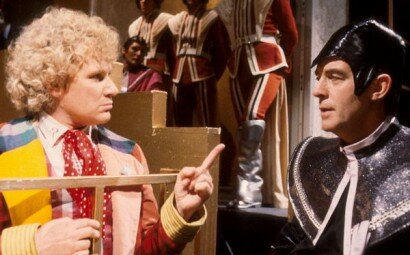
1986 could be seen in a number of ways for Doctor Who fans. The year the show came back from the hiatus. The year the show was reduced to just 14 25-minute episodes a year. The year the Colin Baker era came to an abrupt and premature end. The year that the Eric Saward era came to an end. The year we lost Robert Holmes.
All of the above statements are true, before you enter into the realm of opinion of that season’s sole story, The Trial of a Time Lord, the longest Doctor Who story of all time at 14 episodes, although fan opinion on it should really count as four stories rather than one is divided to this day, despite what the actual titles of the episodes as broadcast state. Certainly fans publicly moaning in the UK about the show reached a new level this year (which is a shame, considering what an awesome story it was), so let’s not dwell on that and talk about how great things were for fans in North America. After nearly two years of waiting, fans finally to a chance to see Colin Baker as the Doctor - at least some of us did, with his episodes beginning broadcasting in my neck of the woods on Saturday November 1st, 1986. Within 6 weeks, on December 13th, the first 7 Colin Baker adventures had been shown (one full story each successive Saturday) culminating with the broadcast of Revelation of the Daleks on PBS starting at 12:30pm. This was followed by the broadcast of the PBS documentary Doctor Who’s Who’s Who, and then finally by the broadcast of An Unearthly Child for the first time in this area of the world in over 20 years. With pledge breaks the Doctor Who marathon stretched out for the entire afternoon, and then as soon as it was over TVOntario’s broadcast of an episode of Resurrection of the Daleks occurred, making this about 7 straight hours of Doctor Who for a fan to watch, including the earliest and what was the most recent episode we could ever have. In those days, with far fewer channels on cable than today and before the advent of specialty networks doing marathon broadcasts of specific shows on holiday weekends, this was unheard of. And An Unearthly Child! I often forget how impossible that seemed at the time. While the near-two year wait between The Caves of Androzani and The Twin Dilemma seemed agonizingly long at the time, it was always anticipated that we would get the Colin Baker episodes. But the original black and white episodes of Doctor Who did not seem inevitable at all. 1986 was a truly wondrous times to be a Doctor Who fan for both new and old episodes of the show.
Posted by Luca on Monday, July 1 at 8:07 am
(3) Comments
June 20, 2013
50 Glorious Years: Episode 23 - 1985

I know what some of you are thinking - 1985 wasn’t a glorious year for Doctor Who because the hiatus happened - a body blow against the show in which a BBC management that was anti-thetical to the show tried to cancel it resulting in a public knocking of the show and a loss of confidence by the British public, which ultimately led to the show being effectively cancelled after 1989.
It’s true that this happened in 1985 but it was still a glorious year for Doctor Who. First there was the content of the programme itself. Season 22 was Colin Baker’s first full year as the Doctor and the first season for the show to be made exclusively in 45-minute episodes, featuring the return of the Cybermen, the Daleks, the Sontarans and the 2nd Doctor and Jamie! A deeper foray into black humour than we’d ever seen before, contrary to what the reappearance of so many classic monsters and characters might suggest, the show was definitely breaking new ground 22 seasons in, which is no mean feat!
It was also a glorious year to be a 12 or 13 year old fan, at least in North America. We were still getting new Peter Davison episodes in my area in 1985 (the final “new” one not being The Caves of Androzani, but rather long-delayed The Five Doctors which the BBC always charged more for. With TVO unable or unwilling to purchase it and my local PBS station seemingly unable to afford the extra price tag, there was a time when I thought I’d never ever seen The Five Doctors. That might have been over 30 years since I thought that, but I still remember that feeling and don’t take it for granted today. A bunch of “new” Jon Pertwee’s were also shown in my area for the first time in 1985 - stories that for various reasons (much to do with not existing fully or at all in colour at the time) hadn’t been included in previous Pertwee packages. Target novels continued to flow into bookstores and then into fan’s hands after they purchased them. All in all, the notion of Tom Baker being the “only” or “main” Doctor had dissipated at this time amongst fans given the success Pertwee and Davison’s episodes during this time. The show was entering into a troublesome period in the UK, but in North America its popularity truly was at an all time high (and so was DWIN’s membership). On the verge of breaking into the mainstream, a shrewd BBC management would have tried to cultivate that, but that isn’t what the BBC had at the time in relation to Doctor Who. Still, this is a celebration, so the less said about that, the better. 1985 was still a great time to be a Doctor Who fan.
Posted by Luca on Thursday, June 20 at 8:01 pm
(2) Comments
June 10, 2013
50 Glorious Years: Episode 22 - 1984
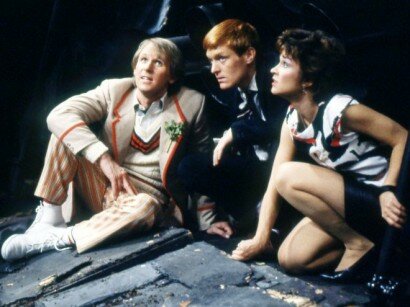
There’s a tendency to think that the celebrations for Doctor Who‘s 20th Anniversary ended with the broadcast of The Five Doctors in November 1983. But that wasn’t really the case. Just over a month later another season of Doctor Who began broadcasting, the 21st in total, which effectively kept the celebrations going. Another 22 episodes of Peter Davison as the Doctor, and then suddenly in March of 1984, there was a 6th Doctor - Colin Baker, who got a whole story to himself at the end of the 21st season. On screen the changes came fast and furious - three stories in a row (Resurrection of the Daleks, Planet of Fire and The Caves of Androzani) a regular cast member left, while two different ones joined. Fans and viewers said goodby rapidly to Janet Fielding, Mark Strickson and Peter Davison - and in fact they said hello to Nicola Bryant as Peri at the same time as saying goodbye to Turlough.
While ratings held steady in the UK, the show just got more and more popular in North America. In my particular corner of the world, Doctor Who was now being broadcast a remarkable 8 times every 7 days. This was long before the idea of a specialty cable channel doing a “marathon” of episodes of one particular tv series became fashionable. There were still not that many channels available on regular cable (even if “pay tv” was now making inroads) in comparison to today (although we had a lot more than the 4 regular channels that the UK was now “up” to). The local PBS station broadcast one episode every weekday at 6pm while also showing an entire Doctor Who “movie” (ie. all episodes from a story edited together) on Saturday afternoons, usually starting at 4pm. They would end at 5:30, then you’d have a couple hours off before TVOntario broadcast another episode on early Saturday evening, which they would repeat Thursday evenings (which meant on Thursday nights you had even a shorter break between episodes). Target novels were now starting to proliferate like never before - if I missed a Saturday broadcast of an entire story that I hadn’t seen before, I could walk down the street to my local convenience store and buy the target novel of the new Peter Davison story that I had missed (note, I did this for both Snakedance and Enlightenment - my family did not get a VCR until late summer 1985). Heck, that’s something that I can’t do today (even substituting Target novels for DVD releases).
1984 was the first year that I discovered and bought Target books, and actually the first time I owned a piece of Doctor Who merchandise - all inspired from seeing a PBS pledge break during Mawdryn Undead where one of the gifts that you could receive in return for your pledge was the novelization of that very story. It seemed so incredible to someone about to turn 12 - if I was to go out and buy a novelization of a Doctor Who story, I could re-read it again and again and again and re-live the experience of the story again and again and again. Nothing seemed so exciting! By the time the story had finished broadcast that Saturday afternoon in the summer of 1984, Doctor Who had become my favourite show and I knew that it was always going to be. And that’s why for this Doctor Who fan, 1984 was perhaps the best year ever to be a fan of Doctor Who.
Posted by Luca on Monday, June 10 at 9:51 pm
(2) Comments
June 03, 2013
The 12th Doctor
This was a post I was hoping not to have to write for a good many years…..it just seems like yesterday since Matt Smith was cast as the 11th Doctor. But as he has announced his departure in the role and it is likely that the 12th Doctor has either already been cast or will be cast very soon, we haven’t got much time to make our picks for the new 12th Doctor. Here are mine.
1. Stephen Mangan
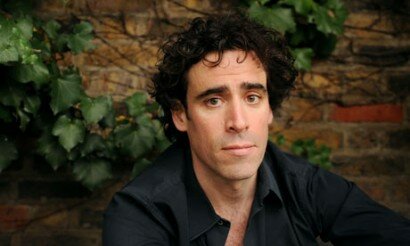
Many feel the star of the BBC’s tv adaptation of the Dirk Gently novels by Douglas Adams probably took himself out of the running by having taken a Doctor-like role in the past couple of years. They say he’s too obvious a choice. But barely anyone (comparative to Doctor Who) has even seen the Dirk Gently series (broadcast on BBC4 and ran for just 4 episodes), particularly in North America, a market very much in mind for the people making Doctor Who these days. What his performance as Dirk Gently proved is that he is suited to the role. He’s gotten a lot of press recently having tweeted a pic himself with a Tom Baker scarf the day before Smith’s departure was announced with a cryptic Doctor Who comment in the tweet. But I should point out that I’m not jumping on any bandwagon - when we did our picks for the 11th Doctor five years ago, he was one of my top choices then as well - in fact, if you search back to November 4th 2008, he was actually the first person I suggested in our “Who I’d Like to Be Who” series of posts. I haven’t changed my mind since then.
2. Peter Serafinowicz

Why? Because if he became the Doctor, we could get rid of the psychic paper and cut down on the sonic screwdriver usage as the 12th Doctor would be the first incarnation to defeat the enemy or gain entry to some place by doing Paul McCartney impressions. Or Ringo Starr impressions. Or Michael Caine impressions. Or just about any kind of impression.
3. Ben Wishaw

Probably a better choice for Doctor #13. The new Q from James Bond looks younger than Matt Smith but is a year or so older. However, I think they should go about 10 years older at least. If not, Ben could be the man
4. John Bradley-West
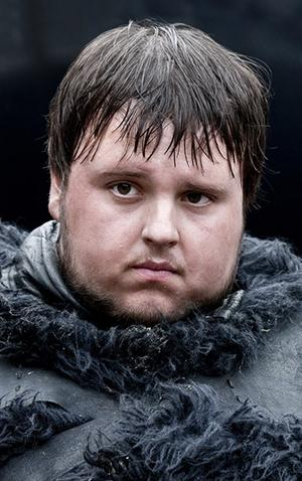
There’s been much talk that the next Doctor should be black, or that the next Doctor should be a woman, or that the next Doctor should be a blind, crippled, Guatemalan Lesbian, all because we have never had one in the role before therefore we delilberately need to have one now. In the spirit of affirmative action in fiction, I think the next Doctor should be a short, bearded, pudgy guy with a high pitched voice, because we’ve never had one of those in the role before either. And what better actor than John Bradley-West, who plays Sam in HBO’s Game of Thrones?
For what it is worth, it is the opinion of this blog writer that the next Doctor “should” not be anything other than the best actor for the role.
More choices to come - while there’s still time.
Posted by Luca on Monday, June 3 at 10:14 pm
(41) Comments
June 02, 2013
50 Glorious Years: Episode 21 - 1983
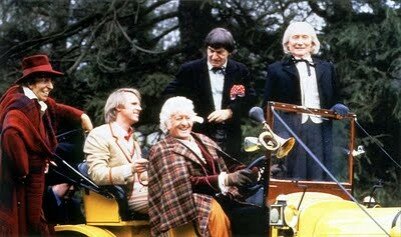
1983 is turning out to share a lot of characteristics with 2013. It was the biggest anniversary celebration the show had done (it remains to be seen whether the 50th will top it), featuring fewer regular number of episodes in the season itself (in 1983 it was 22, rather than the typical 26), a multi-Doctor anniversary special in November, with the public announcement that there will be a new Doctor taking place in the summer months after the filming on the anniversary special had been done in the spring but before the broadcast in November (that’s when Peter Davison announced his departure - summer of 1983. A shame that Matt Smith has now down the same in the summer of 2013).
Of course, the 22 episodes were planned to be a full run but another BBC strike put paid to the production of the final four episodes, so the return of the Daleks planned for that season was postponed until the 21st season in 1984 (much different from whatever the reasons are for the fewer number of episodes in 2013). Despite that disappointment, 1983 was for many fans the happiest time to be a fan during the classic series days. Huge conventions and events were now happening on either side of the Atlantic (in places like Chicago and Longleat in the UK). Who Merchandise was being produced at increasingly higher levels (this year saw the publication of the first of the large Hardbound Peter Haining books on the show, A Celebration (which proved to be so successful that they published a similar HB large book every year for the next 5 years even when they were without a significant anniversary to celebrate), as well as the first story to be released on home video - Revenge of the Cybermen - picked as the first choice because of how overwhelmingly popular the Cybermen now were following the broadcast of Earthshock). The 90 minute special The Five Doctors had such an incredible amount of hype for it, probably the most for any Doctor Who story to date, making it virtually impossible not to be swept up in the excitement. It was a tremendous celebration that was enjoyed by Who fans all over the world in 1983. A glorious year indeed!
Posted by Luca on Sunday, June 2 at 6:28 am
(1) Comments
May 26, 2013
50 Glorious Years: Episode 20 - 1982

It was a new beginning for Doctor Who in 1982. Peter Davison burst on to the scene in fine form with one of Doctor Who‘s finest seasons, a new time-slot in the UK, and ratings that on average, nearly doubled that of the previous season. Season 19 if often lauded for being the season which arguably shows Doctor Who‘s diversity better than any other season, even to this day. Stories set either totally or partially in Earth’s future, earth’s past, present day, alien planets, spaceships and even in the mind of one of the companions. The season incuded (amongst others) the cerebral, surrealistic Kinda, the “hard” sci-fi of Four to Doomsday, the fantasy of Castrovalva, a pseudo-historical with The Visitation, the first “pure” historical with Black Orchid and the all-out action-packed space epic Earthshock, which proved to be the biggest hit of the season and arguably, in its day, the most popular Doctor Who story of all time. From new monsters, returning monsters, new villains and the most brave and bold departure for a companion the series had ever done, the 1982 season was truly a special and memorable one.
It was quite the season for writer Eric Saward. He took over from Christopher Bidmead (with Antony Root sandwiched for a few months in between) as the show’s script editor while scripting two stories, the aforementioned The Visitation and Earthshock. It is difficult to think of another writer in the classic series days who had such a quick and impactful debut on the show - he went from being commissioned as a freelance writer for a debut script to becoming the show’s script editor and top writer by the end of the same year.
Outside of the UK, the series continued to gain in popularity around the world. In the US, the BBC achieved one of its biggest sales ever in this year - the entirety of the Doctor Who back catalogue (at least in terms of complete stories) to the US PBS stations. It was one of the most lucrative BBC sales to date, and the money that it generated was put back into other programmes rather than Doctor Who, showing the value of the property to the BBC just a year before its biggest anniversary celebration yet…..but that is for our next entry.
Posted by Luca on Sunday, May 26 at 11:52 am
(8) Comments
May 18, 2013
The Name of the Doctor is…...

.....the Valeyard! Or at least that was one of the names given in the episode. What did you all think of the season finale, The Name of the Doctor? How many of you guessed that ending? How many of you guessed that beginning? Let us know your thoughts. Don’t stop for the next six months - because next up is the 50th Anniversary special! Or maybe we should call it the 2nd part of the 50th Anniversary special….
Posted by Luca on Saturday, May 18 at 8:27 pm
(35) Comments
May 17, 2013
50 Glorious Years: Episode 19 - 1981
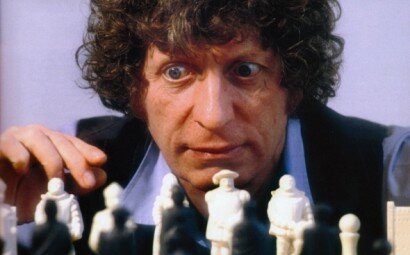
1981 was an extremely eventful year for Doctor Who, even with only 3 new stories (comprising 12 episodes) broadcast in the UK (Warriors’ Gate through Logopolis). Most notably, the longest running Doctor (which is still the case to this day), Tom Baker left after the end of this, his seventh season. Romana and K9 (each having been around a few years in different incarnations) left a couple of stories before Tom Baker did (although K9 would re-appear on our screens before the end of the year, though not, technically-speaking, in Doctor Who). A new, fifth Doctor, debuted in the closing seconds of Logopolis. It would not be until January 1982 that viewers got to see a substantial performance of Peter Davison in the role, but his debut in 1981 was quite revolutionary and, as it has transpired all these years later, quite influential. The Doctor could now be played by a younger man.
That wasn’t all. With a delay to a new broadcast slot for the next season to weekdays in January 1982, 1981 was the last of 18 consescutive years where Doctor Who was broadcast in Saturdays in the UK - quite remarkable when you think about the show being a tradition and an establishment. In anticipation of the season (and because of the then-unprecedented 9 month gap between seasons), the BBC broadcast a selection of stories from each previous Doctor for a repeat run in the autumn of 1981, entitled “The Five Faces of Doctor Who”. For many younger fans (at least, though younger or about the same age of the programme) this was the first chance to watch stories from Doctor’s other than Tom Baker, or to watch black and white Doctor Who episodes. The repeat run was the first shift in the BBC and those making Doctor Who to start regularly celebrating its past while also making new episodes. The run of five stories showed was An Unearthly Child (and yes, Doctor Who Magazine, that’s what the BBC called as they do now, and not “100,000 B.C.”), The Krotons, The Three Doctors, Carnival of Monsters and the 2nd airing in 1981 of Logopolis. The ratings - with the episodes shown on BBC2 - were excellent for repeats and for something shownn on BBC2. In fact these broadcasts did comparatively better against expectations than the Season 18 episodes did on first airing (including Logopolis, which was a part of both Season 18 and The Five Faces of Doctor Who).
For many fans, the presence of The Krotons as the selected Troughton highlighted (or drew attention to) the fact that so many episodes in the archives were missing - The Krotons was the only complete 4-part Patrick Troughton story in the archives at that time (and there’s only been one more recovered since then). In 1981 Doctor Who Magazine published a list of what was missing from the archives, making the fact that so much of Doctor Who was missing in the archives public knowledge for the first time. The release of this information was a very dramatic event for many Doctor Who fans in 1981. But some fans didn’t accept this news passively - 1981 is also when the yearning for the recovery of missing episodes and the hunting for them began for so many fans, which still happenining even to this day…..
1981 ended with the broadcast of the first ever spin-off of Doctor Who - K9 and Company. Elisabeth Sladen and John Leeson were back, and nobody knew then that this was only to be the first of two spin-offs for Doctor Who that they would play their customary roles in together!
Something else happened in 1981 with Doctor Who which was very eventful for this writer. On October 29th 1981, I watched Doctor Who for the first time! The episode was The Pirate Planet Part 3 on its Thursday repeat (although I didn’t realize it was even being shown on Saturdays, at least for the first few weeks I watched). Hooked by the cliffhanger to that episode of the Doctor falling off the edge of a plank, I had to tune in next week to find out how the Doctor got out of it. And I’ve been hooked ever since…...
Posted by Luca on Friday, May 17 at 11:02 am
(1) Comments
May 11, 2013
Silver Upgrade

The Cybermen return in Nightmare in Silver, penned by Neil Gaiman and the first Cybermen story to feature “Silver” in the title and on going chess match in 25 years. Let us know your thoughts on the episode, and whether it was an upgrade on Silver Nemesis (or any other episode you care to compare it to).
Posted by Luca on Saturday, May 11 at 8:06 pm
(6) Comments
May 10, 2013
50 Glorious Years: Episode 18 - 1980
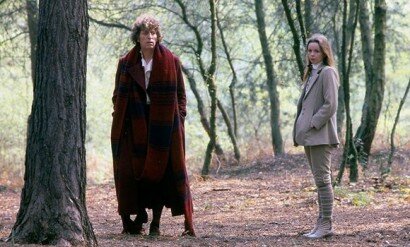
The 1980’s! Doctor Who’s third different decade that it has existed in, and one that started so brightly. Not with the UK ratings, which saw the show take a ratings dive in large part because the BBC were now losing the Saturday ratings battle in general from new and networked competition. But 33 years later it’s really tough to care about ratings in one country too much when the quality of the episodes being made and shown were so incredibly high-quality. 33 years later one can watch the first season with new producer John Nathan-Turner at the helm (with Christopher H. Bidmead now script editing) and seeing a show that is trying very hard. There was a whole new musical style to the show (which included a new energetic version of the theme tune, but also all of the incidental music now done by the Radiophonic Workshop at the BBC). Whereas previous seasons usually only tended to feature one or two new writers per season, Season 18 featured as many as 5 stories that had new writers (including one script, Full Circle, written by a 17 year old fan, Andrew Smith - something that you’ll never see happen nowadays with the television series). The show had never looked more stylish, with an entire new set of directors used by John Nathan-Turner - Lovett Bickford, Paul Joyce and Peter Grimwade amongst them. It made for a fantastic set of episodes for Season 18, although only 16 of the 28 were broadcast in 1980 - the rest we’ll get to in the next entry, for 1981.
John-Nathan Turner wanted to take the show into the 1980’s and even 30-plus years later, when you watch Doctor Who from beginning to end (or rather, beginning to present day) you can still see what a great job he did. 1980 will always be remembered by Doctor Who fans as the year that JNT came on to the scene and put his stamp on the show.
Posted by Luca on Friday, May 10 at 10:53 pm
(1) Comments

The Doctor Who Blog is a collaborative weblog put together by the people at the Doctor Who Information Network that bring you Enlightenment, the most dangerous Doctor Who fanzine in the world.
The Doctor Who Blog's mission is to provide witty and insightful commentary on the world of Doctor Who in all its various forms. And to make several bad puns and references to jokes Tom Baker once made.

To Monthly Archives
Recent Entries
- The Companion Departures - #9 and #8 - Ian Chesterton and Barbara Wright
- The Companion Dpeartures - #11 & #10 - Jamie McCrimmon and Zoe Herriott
- The Companion Departures - #12 Steven Taylor
- The Companion Departures - #13 Amy Pond and Rory Williams
- The Companion Departures - #14 Tegan Jovanka
- The Companion Departures - #15 - Sara Kingdom
- The Companion Departures - #16 - Katarina
- The Companion Departures - #17 - Vicki
- The Companion Departures - #18 - Vislor Turlough
- The Companion Departures - #19 Mickey Smith
- The Companion Departures - #20 - Rose Tyler
- The Companion Departures - #21 - Martha Jones
- The Companion Departures - #22 - Captain Jack Harkness
- The Companion Departures - #23 - Harry Sullivan
- The Companion Departures - #24 - Donna Noble
